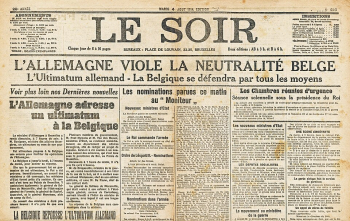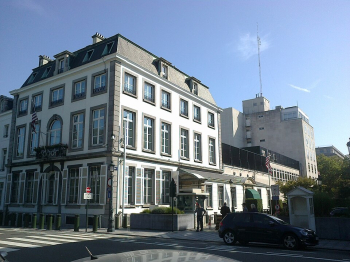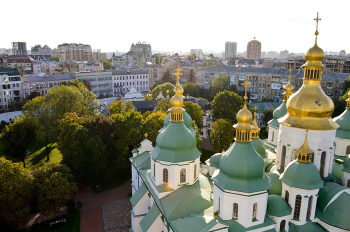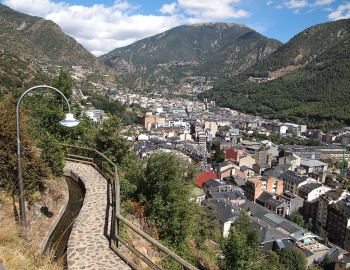Latest News
President von der Leyen addresses the 20th package of sanctions against Russia
 President von der Leyen addresses the 20th package of sanctions against Russia
President von der Leyen addresses the 20th package of sanctions against Russia
European Commission contains cyberattack on mobile systems within hours
 European Commission contains cyberattack on mobile systems within hours
European Commission contains cyberattack on mobile systems within hours
EU releases €3.7 million to help laid-off workers in Austria and Belgium find new jobs
 EU releases €3.7 million to help laid-off workers in Austria and Belgium find new jobs
EU releases €3.7 million to help laid-off workers in Austria and Belgium find new jobs
EU Commission flags TikTok’s “addictive design” as potential breach of Digital Services Act
 EU Commission flags TikTok’s “addictive design” as potential breach of Digital Services Act
EU Commission flags TikTok’s “addictive design” as potential breach of Digital Services Act
Belgian media under strain as layoffs hit Le Soir and other major newsrooms
 Belgian media under strain as layoffs hit Le Soir and other major newsrooms
Belgian media under strain as layoffs hit Le Soir and other major newsrooms
Belgians among Europe’s most pessimistic about the future, new EU survey reveals
 Belgians among Europe’s most pessimistic about the future, new EU survey reveals
Belgians among Europe’s most pessimistic about the future, new EU survey reveals
Homeownership in the EU: 68% of residents own their homes in 2024
 Homeownership in the EU: 68% of residents own their homes in 2024
Homeownership in the EU: 68% of residents own their homes in 2024
EU–US trade deal back on track: European Parliament moves to revive Turnberry tariff laws
 EU–US trade deal back on track: European Parliament moves to revive Turnberry tariff laws
EU–US trade deal back on track: European Parliament moves to revive Turnberry tariff laws
EU approves €90 billion loan to Ukraine to fund war effort through 2027
 EU approves €90 billion loan to Ukraine to fund war effort through 2027
EU approves €90 billion loan to Ukraine to fund war effort through 2027
Interest earned on frozen Russian assets at Euroclear drops 26% as rates ease
 Interest earned on frozen Russian assets at Euroclear drops 26% as rates ease
Interest earned on frozen Russian assets at Euroclear drops 26% as rates ease
Must Read
-
 Zurich introduces Eruv, creating a Sabbath-friendly public zone for Jewish life
Zurich has quietly drawn a new kind of line across the city — one that cannot be seen at first glance, yet carries deep religious and social meaning. Spanning severalRead More...
Zurich introduces Eruv, creating a Sabbath-friendly public zone for Jewish life
Zurich has quietly drawn a new kind of line across the city — one that cannot be seen at first glance, yet carries deep religious and social meaning. Spanning severalRead More... -
 Zurab Musinyan: “Let my case lie at door of Russian special services combating international terrorism…”
Specialized Oil-Loading Seaport Vitino captured by Russian security officials through hostage taking keeps on being a subject of carve-up and litigations by Russian and international companies....Read More...
Zurab Musinyan: “Let my case lie at door of Russian special services combating international terrorism…”
Specialized Oil-Loading Seaport Vitino captured by Russian security officials through hostage taking keeps on being a subject of carve-up and litigations by Russian and international companies....Read More... -
 Young Europeans losing faith in democracy
Recent findings from a comprehensive survey conducted by the YouGov institute for the Tui Foundation reveal a concerning trend among Europe’s youth: a growingRead More...
Young Europeans losing faith in democracy
Recent findings from a comprehensive survey conducted by the YouGov institute for the Tui Foundation reveal a concerning trend among Europe’s youth: a growingRead More... -
 World Refugee Day: Joint Statement by the European Commission and the High Representative
No country, no region in the world has been spared from the impact of COVID-19. The virus is exacerbating existing inequalities and has a disproportionate effect on refugees,Read More...
World Refugee Day: Joint Statement by the European Commission and the High Representative
No country, no region in the world has been spared from the impact of COVID-19. The virus is exacerbating existing inequalities and has a disproportionate effect on refugees,Read More... -
 World peace under strain — yet some countries still shine
As a storm of conflicts, rising militarisation and geopolitical fragmentation rattles the globe, the annual Global Peace Index 2025 paints a soberingRead More...
World peace under strain — yet some countries still shine
As a storm of conflicts, rising militarisation and geopolitical fragmentation rattles the globe, the annual Global Peace Index 2025 paints a soberingRead More... -
 Women still a minority among Flemish professors despite gains elsewhere
Women account for just one in three professors and visiting professors at Flemish universities, according to new figures released on Tuesday by Statistiek Vlaanderen.Read More...
Women still a minority among Flemish professors despite gains elsewhere
Women account for just one in three professors and visiting professors at Flemish universities, according to new figures released on Tuesday by Statistiek Vlaanderen.Read More... -
 Why Andorra finds EU membership unappealing?
Andorra, a small landlocked country located in the eastern Pyrenees mountains between France and Spain, has long maintained a unique position in Europe. With a population ofRead More...
Why Andorra finds EU membership unappealing?
Andorra, a small landlocked country located in the eastern Pyrenees mountains between France and Spain, has long maintained a unique position in Europe. With a population ofRead More...
Latest News
President von der Leyen addresses the 20th package of sanctions against Russia
 President von der Leyen addresses the 20th package of sanctions against Russia
President von der Leyen addresses the 20th package of sanctions against Russia
European Commission contains cyberattack on mobile systems within hours
 European Commission contains cyberattack on mobile systems within hours
European Commission contains cyberattack on mobile systems within hours
EU releases €3.7 million to help laid-off workers in Austria and Belgium find new jobs
 EU releases €3.7 million to help laid-off workers in Austria and Belgium find new jobs
EU releases €3.7 million to help laid-off workers in Austria and Belgium find new jobs
EU Commission flags TikTok’s “addictive design” as potential breach of Digital Services Act
 EU Commission flags TikTok’s “addictive design” as potential breach of Digital Services Act
EU Commission flags TikTok’s “addictive design” as potential breach of Digital Services Act
Belgian media under strain as layoffs hit Le Soir and other major newsrooms
 Belgian media under strain as layoffs hit Le Soir and other major newsrooms
Belgian media under strain as layoffs hit Le Soir and other major newsrooms
Belgians among Europe’s most pessimistic about the future, new EU survey reveals
 Belgians among Europe’s most pessimistic about the future, new EU survey reveals
Belgians among Europe’s most pessimistic about the future, new EU survey reveals
Homeownership in the EU: 68% of residents own their homes in 2024
 Homeownership in the EU: 68% of residents own their homes in 2024
Homeownership in the EU: 68% of residents own their homes in 2024
EU–US trade deal back on track: European Parliament moves to revive Turnberry tariff laws
 EU–US trade deal back on track: European Parliament moves to revive Turnberry tariff laws
EU–US trade deal back on track: European Parliament moves to revive Turnberry tariff laws
EU approves €90 billion loan to Ukraine to fund war effort through 2027
 EU approves €90 billion loan to Ukraine to fund war effort through 2027
EU approves €90 billion loan to Ukraine to fund war effort through 2027
Interest earned on frozen Russian assets at Euroclear drops 26% as rates ease
 Interest earned on frozen Russian assets at Euroclear drops 26% as rates ease
Interest earned on frozen Russian assets at Euroclear drops 26% as rates ease
Must Read
-
 Zurich introduces Eruv, creating a Sabbath-friendly public zone for Jewish life
Zurich has quietly drawn a new kind of line across the city — one that cannot be seen at first glance, yet carries deep religious and social meaning. Spanning severalRead More...
Zurich introduces Eruv, creating a Sabbath-friendly public zone for Jewish life
Zurich has quietly drawn a new kind of line across the city — one that cannot be seen at first glance, yet carries deep religious and social meaning. Spanning severalRead More... -
 Zurab Musinyan: “Let my case lie at door of Russian special services combating international terrorism…”
Specialized Oil-Loading Seaport Vitino captured by Russian security officials through hostage taking keeps on being a subject of carve-up and litigations by Russian and international companies....Read More...
Zurab Musinyan: “Let my case lie at door of Russian special services combating international terrorism…”
Specialized Oil-Loading Seaport Vitino captured by Russian security officials through hostage taking keeps on being a subject of carve-up and litigations by Russian and international companies....Read More... -
 Young Europeans losing faith in democracy
Recent findings from a comprehensive survey conducted by the YouGov institute for the Tui Foundation reveal a concerning trend among Europe’s youth: a growingRead More...
Young Europeans losing faith in democracy
Recent findings from a comprehensive survey conducted by the YouGov institute for the Tui Foundation reveal a concerning trend among Europe’s youth: a growingRead More... -
 World Refugee Day: Joint Statement by the European Commission and the High Representative
No country, no region in the world has been spared from the impact of COVID-19. The virus is exacerbating existing inequalities and has a disproportionate effect on refugees,Read More...
World Refugee Day: Joint Statement by the European Commission and the High Representative
No country, no region in the world has been spared from the impact of COVID-19. The virus is exacerbating existing inequalities and has a disproportionate effect on refugees,Read More... -
 World peace under strain — yet some countries still shine
As a storm of conflicts, rising militarisation and geopolitical fragmentation rattles the globe, the annual Global Peace Index 2025 paints a soberingRead More...
World peace under strain — yet some countries still shine
As a storm of conflicts, rising militarisation and geopolitical fragmentation rattles the globe, the annual Global Peace Index 2025 paints a soberingRead More... -
 Women still a minority among Flemish professors despite gains elsewhere
Women account for just one in three professors and visiting professors at Flemish universities, according to new figures released on Tuesday by Statistiek Vlaanderen.Read More...
Women still a minority among Flemish professors despite gains elsewhere
Women account for just one in three professors and visiting professors at Flemish universities, according to new figures released on Tuesday by Statistiek Vlaanderen.Read More... -
 Why Andorra finds EU membership unappealing?
Andorra, a small landlocked country located in the eastern Pyrenees mountains between France and Spain, has long maintained a unique position in Europe. With a population ofRead More...
Why Andorra finds EU membership unappealing?
Andorra, a small landlocked country located in the eastern Pyrenees mountains between France and Spain, has long maintained a unique position in Europe. With a population ofRead More...

A new Eurobarometer survey released today reveals that Europeans view respect for democracy, human rights, and the rule of law (38%) as well as economic, industrial, and
Read more: Eurobarometer survey reveals democracy and economic power as key strengths of the EU

Independent and fact-based journalism is vital for safeguarding democracies, as it exposes injustices, holds leaders accountable, and empowers citizens to make informed
Read more: New legislation promotes media freedom and protects journalists

Switzerland's Universities of Zurich and Geneva are embarking on a pioneering initiative called the 'Citizen Council 2025' project starting in November.
Read more: Swiss Universities explore new democratic models with Citizen Council experiment

In an unexpected address at the Society of Editors' 25th anniversary conference, Prime Minister Rishi Sunak issued a stern warning against the exploitation of new technologies
Read more: Rishi Sunak sounds alarm on tech-enabled propaganda and 'deep fakes'

Belgian author David Van Reybrouck emphasized the need for the democratization of climate policy during an informal meeting of European environment ministers.
Read more: Author David Van Reybrouck advocates for climate policy democratization
